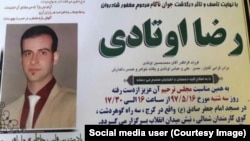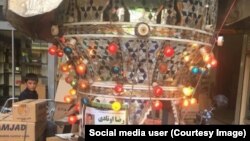An overseas-based Iranian news site says Iranian authorities have pressured relatives of the lone person killed in nationwide antigovernment protests last week to identify the slain man as a pro-government militiaman.
Twenty-five-year-old Reza Otadi was killed during an antigovernment demonstration in the city of Karaj late Friday. State-run news agency Fars said Otadi was shot by an unidentified gunman in a passing car.
In a Tuesday report, the IranWire news site run by exiled Iranian journalists quoted an unnamed male friend of Otadi as saying Karaj’s governor and pro-government Basiji militiamen attended Otadi’s funeral Monday and promised to find his killer. But, the friend said they also asked family members to identify Otadi as a Basiji martyr after the militiamen claimed the slain man as one of their own by displaying his picture around their local base. The friend criticized that label as inappropriate, citing antigovernment social media comments that he said Otadi had posted.
VOA Persian found a Facebook account that appeared to belong to Otadi but could not definitively determine his political leanings from the publicly visible posts.
IranWire quoted a second unnamed friend of Otadi as expressing regret for what that friend said was family members’ acceptance of the authorities’ request to declare Otadi as a Basiji martyr.
A poster announcing a Tuesday memorial ceremony for Otadi at a Karaj mosque made no mention of his affiliation. Photos of the poster were shared on social media and verified by VOA Persian. One photo showed the poster displayed on a round fixture shaped like a crown on a local street. Known as a “hejleh”, the traditional Iranian mourning fixture is placed in a public space for several days to commemorate a man who dies without having been married.
Similar controversies over the affiliation of people killed in antigovernment protests have erupted in Iran before. Iranian authorities and state-controlled media asserted that two male students killed in a February 2011 protest in Tehran, Saneh Jaleh and Mohammad Mokhtari, were government supporters — an assertion denied by friends of the two men and rights activists who accused Iranian security forces of killing them.
This report was produced in collaboration with VOA’s Persian Service.





